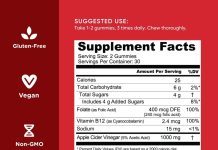Have you ever wondered if there are certain foods that can give your metabolism a much-needed boost? Whether it’s to shed a few pounds or simply improve your overall energy levels, the idea of finding specific foods that can aid in speeding up your metabolism is certainly intriguing. Well, the good news is that there are indeed certain foods that have been shown to have a positive impact on our body’s metabolic rate. In this article, we will explore some of these foods and how they can potentially benefit our metabolism. So if you’re looking for a little extra help in revving up your energy-burning engine, keep reading!
Review contents
Understanding Metabolism
Metabolism is often a topic of discussion when it comes to health and fitness. But what exactly is metabolism and what role does it play in our bodies? Metabolism refers to the chemical processes that occur within our bodies to convert the food we eat into energy. It is a complex system that involves various biochemical reactions to break down nutrients, synthesize proteins, and eliminate waste products. In simple terms, it is the rate at which our bodies burn calories to maintain basic bodily functions, such as breathing, digestion, and circulation. Understanding metabolism is crucial for maintaining a healthy weight and overall well-being.
Factors Affecting Metabolism
While genetics and age play a role in determining our metabolic rate, there are several factors that we can control to optimize our metabolism. These include:
-
Diet: The types of foods we consume can have a significant impact on our metabolism. Certain foods, such as lean proteins, spicy foods, and green tea, have been shown to boost metabolism and increase calorie-burning.
-
Physical activity: Regular exercise and physical activity help to increase metabolic rate by building muscle mass and improving overall fitness. Incorporating both cardiovascular exercises and strength training into our routine can have long-term effects on our metabolism.
-
Muscle mass: Having a higher muscle mass can increase our metabolic rate as muscles require more energy to maintain than fat. Incorporating strength training exercises into our fitness routine can help increase muscle mass and boost metabolism.
-
Sleep: Adequate sleep plays a crucial role in regulating our metabolism. Lack of sleep can disrupt the hormones that control appetite and metabolism, leading to weight gain and a slower metabolic rate.
Now that we have a better understanding of metabolism and its various factors, let’s explore some common myths and misconceptions surrounding it.
This image is property of media.glamour.com.
Myths and Misconceptions
One common misconception is the idea of “metabolism-boosting” foods. While certain foods may have a slight effect on metabolism, the notion of specific foods significantly increasing metabolic rate is largely exaggerated. It is essential to approach these claims with skepticism and focus on overall dietary patterns rather than relying solely on individual foods.
Another commonly misunderstood concept is thermogenesis. Thermogenesis refers to the body’s ability to produce heat and increase energy expenditure. Some foods, such as spicy foods and chili peppers, contain compounds like capsaicin that can temporarily increase thermogenesis. However, the effect is relatively small and should not be solely relied upon for weight loss or metabolism boosting efforts.
Recommended Foods for Boosting Metabolism
While no single food can magically skyrocket our metabolic rate, incorporating certain foods into our diet can have a beneficial impact on metabolism. Here are ten foods that are often associated with boosting metabolism:
1. Lean Proteins
Protein-rich foods, such as lean meats, poultry, fish, tofu, and legumes, require more energy to digest compared to fats and carbohydrates. This is known as the thermic effect of food (TEF). Including lean proteins in our meals can help increase our metabolic rate and promote satiety.
2. Spicy Foods
Spices like chili peppers contain a compound called capsaicin, which can temporarily increase thermogenesis and boost metabolic rate. Adding spices to our meals can add flavor and provide a slight metabolic boost.
3. Green Tea
Green tea is rich in antioxidants called polyphenols and catechins, which have been shown to have a beneficial effect on metabolism. These compounds may increase fat oxidation and improve insulin sensitivity, leading to increased calorie burning.
4. Whole Grains
Foods like oatmeal, quinoa, and brown rice are examples of whole grains that are rich in fiber. The high fiber content of whole grains helps slow down digestion, keeping us feeling full for longer and potentially increasing calorie expenditure.
5. Chili Peppers
As mentioned earlier, chili peppers contain capsaicin, which can temporarily increase thermogenesis. Adding some heat to our meals with chili peppers can provide a slight metabolic boost.
6. Coffee
Coffee contains caffeine, a stimulant that can increase metabolic rate and enhance fat oxidation. However, it is important to consume coffee in moderation and be mindful of its potential side effects, such as increased heart rate and anxiety.
7. Apple Cider Vinegar
Apple cider vinegar has gained popularity for its potential health benefits, including its impact on metabolism. Some studies suggest that acetic acid, a compound found in apple cider vinegar, may help increase fat burning and improve insulin sensitivity.
8. Avocados
Avocados are a nutrient-dense fruit that contains healthy fats, fiber, and various vitamins and minerals. The monounsaturated fats found in avocados can help boost metabolism and promote satiety.
9. Nuts and Seeds
Nuts and seeds are packed with healthy fats, protein, and fiber, making them a great addition to a metabolism-boosting diet. The combination of nutrients in nuts and seeds helps to keep us feeling full and satisfied.
10. Water
While not a food, water plays a crucial role in optimizing metabolism. Staying hydrated is essential for maintaining proper bodily functions, including digestion, nutrient absorption, and energy production.
This image is property of cdn2.stylecraze.com.
The Science Behind the Recommendations
Now that we have explored some recommended foods for boosting metabolism, let’s dive into the science behind these recommendations.
Thermic Effect of Food and Protein Synthesis
The thermic effect of food refers to the energy required for digestion, absorption, and metabolism of nutrients. Protein has the highest thermic effect, requiring more energy to process compared to carbohydrates and fats. This means that consuming more protein as part of our diet can increase our metabolic rate.
Capsaicin and Thermogenic Properties
Capsaicin, the compound responsible for the heat in chili peppers, has been shown to temporarily increase thermogenesis. It activates receptors in the body that stimulate the sympathetic nervous system, leading to an increase in energy expenditure.
Caffeine and Its Impact on Metabolism
Caffeine is a stimulant that can temporarily increase metabolic rate and enhance fat oxidation. It activates the sympathetic nervous system and stimulates the release of adrenaline, leading to increased calorie burning.
Polyphenols and Catechins in Green Tea
Green tea contains polyphenols and catechins, which have been shown to increase fat oxidation and improve insulin sensitivity. These compounds may help increase metabolic rate and aid in weight management.
Fiber Content and Metabolic Benefits of Whole Grains
The high fiber content of whole grains slows down digestion, promoting satiety and potentially increasing calorie expenditure. Fiber also helps regulate blood sugar levels and improve insulin sensitivity, which can impact metabolism.
Hydration and Its Role in Optimizing Metabolism
Staying hydrated is essential for maintaining metabolic functions. Water plays a crucial role in digestion, nutrient absorption, and energy production. Dehydration can lead to a decrease in metabolic rate and overall energy expenditure.
Other Factors that Influence Metabolism
In addition to diet and specific foods, there are other factors that can influence our metabolism:
Physical Activity and Exercise
Regular physical activity and exercise help increase metabolic rate by building muscle mass and improving overall fitness. Both cardiovascular exercises and strength training can have long-term effects on metabolism.
Muscle Mass and Its Effect on Metabolic Rate
Muscle tissue requires more energy to maintain than fat tissue. Therefore, individuals with a higher muscle mass tend to have a higher metabolic rate. Incorporating strength training exercises into our fitness routine can help increase muscle mass and boost metabolism.
Sleep and Its Impact on Metabolism
Adequate sleep is crucial for regulating our metabolism. Lack of sleep can disrupt the hormones that control appetite and metabolism, leading to weight gain and a slower metabolic rate. Prioritizing quality sleep is essential for maintaining a healthy metabolism.
This image is property of www.stylecraze.com.
Conclusion
Understanding the complexity of metabolism is key to optimizing our health and maintaining a healthy weight. While specific foods may have a slight impact on metabolism, it is essential to approach claims of “metabolism-boosting” foods with caution. Instead, focusing on a balanced diet that includes lean proteins, whole grains, spices, and adequate hydration can have a positive effect on metabolism. Additionally, incorporating physical activity, building muscle mass, and prioritizing quality sleep are crucial factors in maintaining a healthy metabolism. With this holistic approach, we can support our body’s natural metabolic processes and achieve optimal well-being.






























